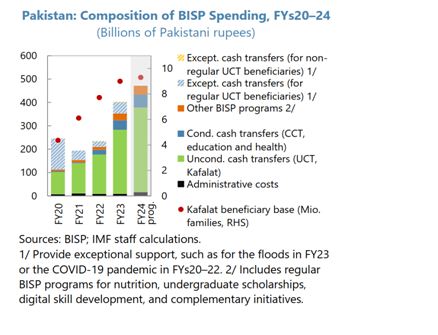INP-WealthPk
Uzair bin Farid
The government has increased allocation for Benazir Income Support Program (BISP) to Rs472 billion in the budget for fiscal year 2023-24. According to data available with WealthPK, BISP allocation has been increased to 0.4% of gross domestic product (GDP) for FY24, which is a quarter increase over the total regular BISP spending of FY23. Increase in the BISP allocation will allow the government to includemore than 300,000 new families in the Unconditional Cash Transfer (UCT) Kafalat Program starting from July 2023.It will also add more money tothe coffers of the BISP to providea buffer against inflation so that the families that benefit from the BISP UCT Kafalat Program see a concomitant increase in their stipends as prices increase in the country. These measures are, however, inadequate given that Pakistan continues to face a challenging socio-economic situation resulting from floods last year and the lingering effects of the Covid-19 pandemic.
Policy recommendations regarding BISP from the International Monetary Fund (IMF) for social protection include acceleration of the enrolment of Conditional Cash Transfer (CCT) programs for child education and health to sustain the human capital levels of the country with a special emphasis on the education and health of girls.They also suggest that the CCT amounts should be adjusted for rising costs of education and food, in addition to making a provision for undetermined future exogenous shocks like the floods of late last year. Similarly, recommendations have also been made regarding the power and gas tariff for the most vulnerable segments of the population in the form of protected power and gas tariffs slabs for small consumers.

The government is seriously undertaking reforms and efforts to alleviate poverty and increase social protection in the country. In FY23, the total allocation for regular and exceptional BISP schemes amounted to Rs404 billion, representing a total of 0.4% of the national GDP. The BISP spending in FY23 was a 70% increase over the social spending levels of FY22, which shows the commitment of the federal authorities about ensuring social protection of the most vulnerable segments of the population.
Increased allocation for BISP over the previous fiscal year allowed for the inclusion of 1 million new families into the UCT Kafalat Program, where the total number of families now stands at 9 million registered with the National Socio-Economic Registry (NSER). Also, inflation adjustment was made to the tune of 25% which resulted in the transfer of Rs8,750 per family per quarter starting from January 1, 2023. Under the BISP, a one-time cash transfer of Rs25,000 was also made to 2.7 million families affected by the floods which inundated large parts of the plain regions of the country.
Credit: INP-WealthPk













